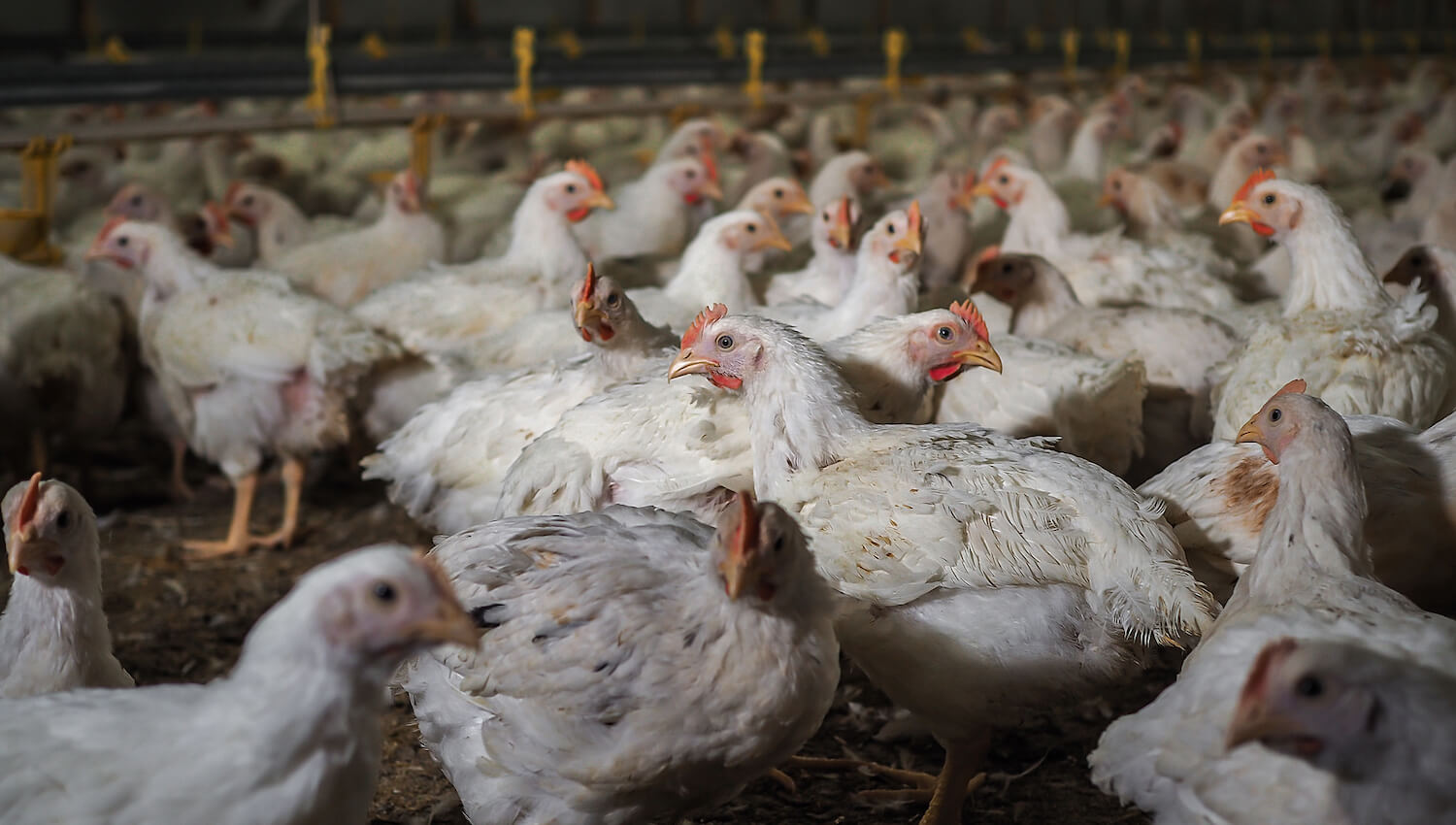Kosher certifications lack purview over how animals are bred, treated, and handled prior to slaughter. Unhealthy genetics and restricted or no access to the outdoors are conditions consistent across animal production in the United States and, increasingly, the world, including for animals that are certified kosher.
Unhealthy Genetics
Second only to farmed fish, poultry endure some of the most intensive farming practices in use today, some of which begin even before conception, thanks to genetics that cause tremendous welfare problems. Rather than undergoing natural selection like wild animals, domesticated species are subject to artificial selection. We humans identify desirable traits and breed to perpetuate them, sculpting animals’ genetic history to our own benefit so that generation after generation will look exactly how we want—and to meat companies, that means maximizing meatiness. In chickens we’ve selected for massive pectoral muscles at the cost of weak immune systems and fragile musculoskeleture. This holds true across the board; genetic hybridization techniques are standard for virtually all poultry on the market—including products labeled natural, free range, organic, and yes, kosher. Empire Kosher owns a line of hybrid meat birds that, like all other conventional chickens, reach market weight early in life and are slaughtered at 38-48 days.((Heilman, Uriel. ‘Inside Empire’s slaughterhouse: The life of a kosher chicken.’ (2011, August 4) Jewish Telegraphic Agency. https://www.jta.org/2011/08/04/united-states/inside-empires-slaughterhouse-the-life-of-a-kosher-chicken))
We know that kosher producers rely on birds with hybrid genetics in part from what hasn’t been said: When JIFA worked with kosher meat companies to reintroduce heritage chicken to the market for the first time in over 50 years, no existing kosher companies came forward to claim that they already raise heritage birds. Reintroducing 19th century chicken breeds (with higher welfare genetics) to the market was newsworthy for the simple reason that modern kosher meat is typically a product of intense genetic manipulation, just like the rest of meat sold in American grocery stores. Indeed, heritage kosher chicken was special because it’s not factory farmed kosher meat, which remains the norm.
Husbandry: No Outdoor Access
Few shoppers understand animal welfare in enough detail to accurately judge how “food animals” are raised (through no fault of their own; corporations take painstaking measures to ensure opacity), but most people have a similar sensibility around basic freedoms. For example, nearly half of Americans believe that a “humane” label should mean that animals were raised outdoors, on pasture. However, no legal definition for “humane” or “humanely raised” exists —and even the USDA Organic program, which certifies kosher meat, doesn’t guarantee outdoor access. Of course, chickens and turkeys couldn’t derive much benefit from outdoor access anyway, due to genetic engineering. Conventional poultry breeds grow so big so fast that they struggle to walk, and the birds also tend to suffer from compromised immune systems; factory farmed genes make animals quite literally incompatible with the sort of natural behaviors we would expect to see in “humane” agriculture.
Just like when we reintroduced genetically sound birds to the market, our investigation into kosher meat husbandry practices was met with the same silence: no kosher meat companies came forward to claim their animals ever went outside. Our consultation work corroborates this. When consulting on institutional sourcing, we routinely lay out baseline animal welfare standards. In researching qualifying products, we found only one company, KOL Foods, that sells some products which meet our welfare criteria. While KOL does raise some 100 percent pastured cattle and pastured heritage poultry, its supply represents a tiny fraction of the market. Kosher meat products that are widely available in local markets and grocery stores come from cattle that were finished (i.e., fed grain before slaughter in order to fatten up) in crowded feedlots, or hybrid poultry raised indoors. Similarly, after exhaustive research we cannot identify nationally-available dairy and egg products that are both pastured and kosher-certified. As for fish, virtually all aquaculture—the fastest growing and least regulated sector of animal agriculture—can be characterized as factory farming.
Animal welfare standards can play an important role in keeping companies accountable to more humane practices if they serve the interest of consumers, who largely express a desire for higher welfare and willingness to pay for more humane products. Learn more about our direct experience advocating for higher standards and how communities can help drive change.




